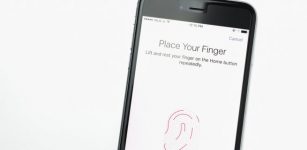Thinking of Using Your Phone’s Fingerprint Feature? Think Again!

Ever thought of using the fingerprint scanner of your smartphone?
There’s no doubt it’s a handy, time-saving feature. But right now, it’s the subject of some interesting debate in court rooms across the United States, all to do with the ‘Fifth Amendment’, which protects American citizens from self-incrimination.
The basic premise is this: In America, police and courts can legally force you to press your finger onto your smartphone to unlock it, but if your phone is locked with a passcode, which is stored in your memory, no one can legally compel you to open it.
Fingerprints vs Passcodes
Under American law, there is a difference between a ‘password’ and a ‘biometric identifier’, such as your fingerprint. You have a right not to reveal the contents of your mind, which include things like passwords, but it is a different story with your fingerprints.
When Apple introduced Touch ID in 2013, the fingerprint scanner on the iPhone was hailed as revolutionary, innovative and pioneering by technology experts who praised Apple for taking a leap forward in enabling cost-effective biometric identification verification to the masses.
Privacy advocates, on the other hand, were wary, and they had good reason to be.
While Apple was embroiled in a case with the FBI over the unlocking of a phone belonging to one of the gunmen in the San Bernardino shooting earlier this year, lawyers in another US courtroom were waging an encryption battle of a different kind, seeking a warrant to force a 29 year old woman with a string of criminal offences, Paytsar Bkhchadzhyan, to press her finger on an iPhone that police seized from the home of her boyfriend, an alleged gang member.
One law professor argued that making Bkchadzhyan press her finger against the phone breached the Fifth Amendment, essentially forcing her to ‘testify —without uttering a word — because by moving her finger and unlocking the phone, she authenticated its contents.
A privacy expert disagreed, saying: “Unlike disclosing passcodes, you are not compelled to speak or say what’s ‘in your mind’ …. adding, ‘Put your finger here’ is not testimonial or self-incriminating.”
Much of the issue stems from how fingerprints are treated as evidence. Like in Australia, American police need search warrants to examine property. Also like Australia, fingerprints are a class of evidence that does not require a warrant in the US. Here, for example, police are allowed to take fingerprints and photographs after arrest.
In the US, fingerprints are classed as “real or physical evidence” sourced from the body and can be forced, unlike communications or knowledge which cannot be compelled without violating the Fifth Amendment.
Unlocking Technology – A Legal Niche
The unlocking of smartphones and computers is fast becoming a legal niche, and cases like Bkhchadzhyan’s are forcing courts to determine the limits of search powers.
The US Supreme Court has held that police can only search phones and compel a person in custody to provide physical evidence such as fingerprints with a valid warrant.
But some legal experts say there should be clearer rules for biometric data because providing a fingerprint to open a digital device gives the state access to a vast trove of personal information, which may constitute self-incrimination.
In a landmark case in 2014, David Charles Baust was accused of assaulting a woman in his bedroom. Baust had CCTV in the subject room, with the recordings transmitted to his iPhone. Police seized Baust’s phone which was locked. A judge found that Baust could be compelled to provide his fingerprint to open a locked phone, but could not be ordered to disclose a passcode. The judge reasoned that providing a fingerprint was akin to giving a key, while giving a passcode — stored in one’s mind — entailed revealing knowledge and therefore testifying.
Closer to Home
In NSW, police are allowed to search through a person’s phone if they have a search warrant, and can conduct forensic procedures such as obtain fingerprints and buccal swabs with a person’s informed consent, or if they obtain a court order.
However, many NSW police officers search arrested persons’ phones without a warrant. There is an argument that such conduct goes beyond the power to ‘search and detain’ under sections 23 and 24 of the Law Enforcement (Powers and Responsibilities) Act 2002 (the ‘LEPRA’), is unlawful, and any evidence derived from that search is therefore liable to exclusion under section 138 of the Evidence Act 1995.
But there is a potentially strong counter-argument – that since police powers of arrest were broadened by section 99 of the LEPRA to include obtaining property and preserving evidence in connection with a suspected offence, it must be permissible to search through and preserve such evidence (eg a phone) after arrest, without a warrant. So unfortunately, the law does not seem to be entirely settled on that point, and it is likely that the circumstances of, and reasons for, the particular arrest will determine the admissibility of the evidence.
The questions surrounding biometric identifiers have not been subjected to legal scrutiny in Australian courtrooms in the same way as the United States, and, as the privilege against self-incrimination is not guaranteed by our Constitution, it will be interesting to see how our courts deal with the issues.
In the meantime, to protect against police pressure to apply a fingerprint, perhaps it’s best not to use the feature at all.






